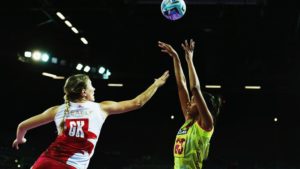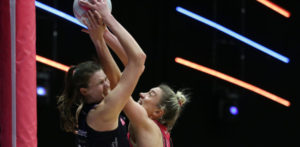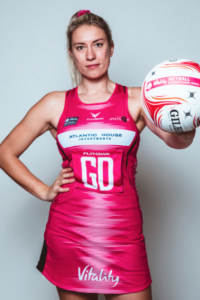Lindsay Keable joined London Pulse in 2020 after nine years at Saracens Mavericks. Due to the pandemic, she might not have represented Pulse as much as she’d have liked, but in that time, she has still established herself as an integral member of the Pulse squad – both on and off the court.
Over a Zoom call, Keable discusses her life in netball from the early beginnings through to the present, and even what netball might look like in the future.

AK: How did you first get into netball?
LK: I was really lucky that I had a Godparent who played netball herself to quite a high level – she ran a local junior club and she invited me along. Also, the junior school I was at, there was a really keen mum that got involved and had a netball club there. I’ve been playing netball for 25 years, so ever since I was seven. It’s definitely been something that’s been a part of my life for a very, very long time.
“I Loved The Social Aspect Of Netball”
AK: What was it about the sport that you loved from an early age?
LK: I loved the social aspect of netball: the fact that it’s a unique sport where you stand next to someone the whole game. No other sport does that, so it’s a great game. Even if you don’t know this person, you leave the court at the end of the game knowing that person a bit better. I really enjoyed that part of it, and I think it was just sort of a lightbulb moment where I was like ‘sounds like a good idea’.
“Maybe I Can Do It”
AK: Did you dream of playing for England when you first started playing?

LK: There were quite a few girls who played for England in our local area; Essex has really strong netball connections and heritage. I knew a little old lady who I admire greatly called Gina Armstrong, and she got me one day around the arm, and she said ‘one day, Linds, you could play in the red dress’, and it was kind of that seed that I was like ‘she thinks I’m good enough, I think I’m good enough, maybe I can do it’.
“Some People Were Encouraging Early Retirement”
AK: What was behind the decision to join London Pulse having played for Saracens Mavericks for so long?
LK: Sam Bird [London Pulse Director of Netball] was actually my coach at Mavericks a little while ago, so, that was great. Also, there’s an England legend that joined Sam in the coaching [at Pulse] – Fiona Murtagh. When I first started at Mavericks at 17, Fiona was still playing. She was a phenomenal athlete and it’s an honour to be a part of a team that’s coached by her – so that was a big draw. I’d been at Saracens Mavericks for nine years, and I think some people were encouraging early retirement, and I wasn’t ready for that.
“I Want To Retire On My Terms”
AK: Did you feel like you had to prove people wrong who were encouraging retirement?
LK: I think there was an element of looking at other players that still play in the league like Jade Clarke, Rachel Dunn – they’re four years older than me, and I was kind of like ‘well, I know I’m getting on, but I want to retire on my terms, not someone else’s terms’. That’s how I felt. At the same time, I was thinking I could still make an impact, still change a game. It’s one of those things where you’re like ‘I’m going to do it’, I’m going to keep going’.
“It’s Great To Be A Part Of A Club That’s So Forward-Thinking”

AK: What’s struck you most about London Pulse since your arrival?
LK: It’s really fresh and young which is exciting, so it’s got an amazing opportunity to make a difference in the netball community. It’s great to a part of a club that’s so forward-thinking and approaches the whole netball side of it as professional as possible. I know a lot of teams are drawing upon this information and knowledge about how to make our game more professional, more into a business, because we need to be self-sustaining. We need to make sure we’re not just asking for money from sponsorships. I was really excited to be joining a club projecting themselves in that direction.
“We Try To Give As Much To The Youngsters As Possible”
AK: What do you see as your main roles at Pulse?
LK: Me and Michelle [Drayne] are in our own 30s club. We have lots of younger players at really different stages of their careers. We have young guns like Sigi [Burger] and Lefebre [Rademan] who are sub 25 but have loads of international experience. Then we have other players who are just making it like Ellie Rattu – Ashleigh Dekker the same. It’s helping guide them, making sure they understand the ebbs and flows of a season. I think there’s a lot coming from myself going ‘well you know how much work you’re putting in – is it [netball] a priority? Are you trying to finish a degree? Is it [netball] everything you strive to do?’ – and having these discussions with them. We try to give as much to the youngsters as possible. I’m really blessed to have had a really long career and the girls do respect that. They’re honourable; they ask me questions; they respect my opinion which I don’t expect. It’s an absolute blessing.
” I Hope To Inspire Like That”

AK: Are your leadership roles something you enjoy?
LK: I’ve sort of grown to like it. If there’s a job to do, and I know I can do it, I just do it. I’m not very good at delegating. That’s the standard I like. I never started off as a captain. I always showed my organisational skills on the court, so leading by example rather than necessarily being gifted. My best captain I’ve ever been under is Sara Bayman; she just had this knack of always being able to say something amazing. You get one of them in a blue moon that has the ability of a ‘Braveheart’ moment and rally the troops. I hope to inspire like that, but I know that’s definitely not one of my strong points, so Hali [Halimat Adio] often takes team talks, because what I’m good at is leading on the court. As captain, you have to know your strengths and weaknesses which can be quite eye-opening at times.
“Leadership Isn’t Just About Your Performances On The Court”
AK: What are some of your qualities as a leader that might not be obvious looking in from the outside?
LK: There’s definitely been a lot learned on my side: leadership isn’t just about your performances on the court, but also what you do off the court. And that’s just small things: you don’t just expect the physio to clean up, you check in with the manager to make sure everything’s done, you thank the officials and the umpires. You do everything you can to lead a professional outcome. I do think whatever a captain does needs to be replicated by the team; if I lead by example to the best of my abilities, the rest of my teammates will follow.
“We’re Here To Nourish And Nurture”
AK: What are your ambitions for the club for the next 2-3 years?
LK: We’re very blessed to have such a youthful group, who hopefully will build year upon year. As the club has the capital city as its doorstop, we should attract some international players. Hopefully, we create a name for ourselves that we’re a growing team, and we’re here to nourish and nurture and make you a better player.
“That’s Really Empowering”
AK: What would you say is the proudest moment of your career?
You can’t take away the feeling of your first [England] cap. But, to be honest, it’s everything. Some of my proudest moments are when some girls who came to see me play netball 10 years ago come up to me now and say ‘you inspired me to go and play GK’. That’s probably what I would say is ultimate pride. I’m proud of myself, yes, but actually the bigger picture of ‘wow, I actually made a difference to some other people’. That makes me even more proud – the fact that I’ve influenced someone on their netball journey. We [women] are trailblazing the way our sport wants to go, and I think that’s a really honourable position to be in. I do admire that us women are what men are being compared to rather than the other way around – that’s really empowering.
Featured Image: courtesy of London Pulse



